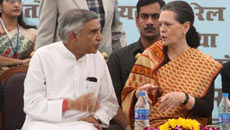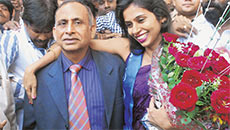When L.K. Advani was dragged kicking and screaming from the post of Bharatiya Janata Party (BJP) president in 2005 under orders from the Rashtriya Swayamsevak Sangh (RSS), a diplomatic cable from the US embassy in Delhi to Washington stated that the event "demonstrated the power of the RSS ... and will likely increase the party's (the BJP's) political decline".
According to Wikileaks, the cable also noted that Advani was "shocked" by the failure of the "second tier" of the BJP leadership comprising, among others Murli Manohar Joshi and Sushma Swaraj, to come to his aid. While leaving the president's post, Advani called for changing the "impression that has gained ground that no political or organizational decision can be taken (by the BJP) without the consent of the RSS functionaries".
Nearly a decade later, Narendra Modi can be said to have changed the impression by making the party choose its own man, Amit Shah, for the president's post without the concurrence of the RSS.
The latest turn of events, which appears to have ended the "continued dominance" of the RSS over the BJP (to quote Wikileaks again), cannot but cause a flutter among the Nagpur patriarchs who had become used to selecting the BJP president in recent years.
After choosing Rajnath Singh to replace Advani, they asked Nitin Gadkari to take Rajnath Singh's place in 2009. But four years later, the RSS had to appoint Rajnath Singh again as president in view of the allegations of sleaze against Gadkari. Now, it is clear that the RSS had little or no say in Shah's appointment. To stretch a point, it can also be said that neither did the BJP, notwithstanding the party's formal association with the selection, since it has been clear ever since Shah was credited with party's excellent showing in Uttar Pradesh in the parliamentary elections that he will be anointed for the post with Modi's blessings.
As Shah is known to be the prime minister's Man Friday because of the long association between the two through the thick and thin of Gujarat's turbulent politics, the belief had gained ground that Modi would trust no one but him in the key position of party chief.
It isn't only the political and organizational closeness of the two which is behind Shah's elevation. It is also undeniable that Modi's insular nature makes him work in close concert with only a few of his hand-picked men.
At a time when a generational shift is taking place in the BJP, and Modi has emerged on top despite the reservations of several senior party members, it is obvious that Modi will be wary of having someone with whom he is not totally familiar to hold a key organizational position.
While this much is in line with Modi's penchant for running a one-man show, whether in Gujarat earlier and now at the national level, what is of interest is how the RSS will react to its marginalization by a former 'pracharak' (preacher), who has now risen beyond all expectations not only to be the lord and master of the BJP, but is probably on his way to be the predominant figure in the Sangh Parivar, as the Hindu nationalists groups are known, as well.
Since such a possibility entails the relegation of the RSS to a secondary position, it will obviously have to take a fresh look at the changing equations. But it has to tread carefully in view of Modi's wide acceptability not only in the party and the saffron brotherhood, but also among the general public which sees in him a new hope after the dismal years of the Congress' dysfunctional governance.
This across-the-board popularity is Modi's great asset unlike Atal Bihari Vajpayee and Advani, who also chafed at the control exercised by the RSS; but since they did not enjoy Modi's general popularity, they had to abide by its dictates most of the time.
The result was that the RSS openly called for their removal as in 2005 when the then RSS chief, K.S. Sudarshan, said that both Vajpayee and Advani should make way for "new leaders". The RSS's grouse against them was mainly about their moderate outlook, especially Vajpayee's, which had become evident during the BJP's stint in power at the centre between 1998 and 2004.
In calling for their replacement, the RSS evidently wanted that the "new leaders" would adopt its own hawkish postures. But this isn't what has happened where Modi is concerned. The RSS, therefore, will be doubly worried.
Not only has Modi curtailed its influence over the BJP as Shah's selection shows, he is also not the hardliner which the RSS thought he will be at the time of the Gujarat riots. It is this belief which makes Ashok Singhal of the Vishwa Hindu Parishad (VHP) say that only Modi can stop the "total Islamisation" of the country. Views of this nature are also expressed by the Hindutva netizens.
But Modi is seemingly following his own line, which is guided by his economic vision, which promises improved conditions for all Indians, Hindus and Muslims alike. The RSS cannot be too pleased.





